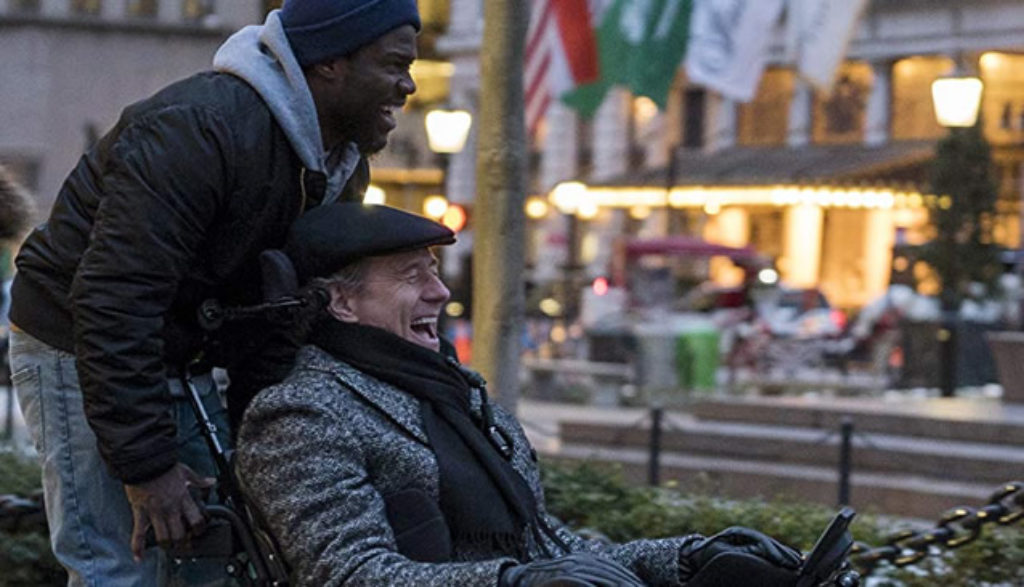
Dell is on parole and needs a job, or it’s back to prison.
But finding work after doing time isn’t easy. Nor is mustering the motivation to care. And, really, motivation has never been Dell’s strong suit anyway. Then again, if he wants to see his tween son, Anthony, he’s going to have to figure out a way to pay child support to his ex, Latrice.
So in a somewhat half-hearted effort to be a better man and stay out of a cell, Dell wanders New York City saying whatever he needs to get a few signatures to show the judge he’s moving in a positive direction when it comes to finding a job.
A few fast food joints and a call center or two later, Dell only needs one more signature. Easy. But when he ends up on the top floor of a super-ritzy housing complex, he’s taken aback. Is this where he’s supposed to be? Is this the janitor job he thought he was looking for?
Never mind, he has no time to waste. He has to pick up his son from school. So, in typical Dell fashion, he barges into an ongoing interview to get what, he believes, is rightfully owed him. But he won’t be getting a signature so easily. Not this time.
That’s because the interview process he interrupts is for an entirely different kind of job: taking care of an extraordinarily wealthy, quadriplegic man named Phillip.
Dell’s obviously not qualified for that job. But Phillip sees something in Dell that’s missing all the other, much more experienced, applicants—much to the horror of the man’s uptight personal business manager, Yvonne. And so he offers Dell not just a signature, but a job.
It’s not quite Dell’s cup of tea, of course. But his desire to be a better dad, and to make some money, motivates him to take a chance. And what begins as an obligatory, judicial step becomes a unlikely friendship that pushes both Dell and Phillip to see their lives from two very different points of view.
Dell, a former convict and absentee father, is trying to move in healthier directions following his recent release from prison. As the film progresses, he works evermore diligently to provide for his son and to pay child support. He also vows not to return to the illegal behaviors that got him locked up in the first place.
Dell and Phillip could hardly be more different. And in many ways, each man’s differences influence and affect the other. Dell’s plain-speaking, straight-shooting approach to life contrasts with the quiet, fearful ways that most people relate to wealthy Phillip—a trait that ingratiates the ex-con to the rich paraplegic. And as Dell slowly learns to care for his paralyzed boss, he learns important lessons about sacrificially serving others and being patient with their weaknesses.
Dell sticks up for Phillip when people treat him as though he’s invisible. In addition, Dell teaches Phillip how to enjoy his life once again. He challenges the disabled man not to give into bitterness and self-pity, encouraging him to start taking real relational risks. Dell also plans trips and outings that are out of the ordinary.
Phillip, a generally kind, intelligent and encouraging man, also teaches Dell a lesson or two. Phillip speaks life into Dell, calling out his positive characteristics, affirming his intelligence, forgiving him and encouraging his potential as a man and a businessman, all of which Dell is unused to. When someone brings up Dell’s checkered past to shame him, Phillip says that he’s only interested in Dell’s present. Phillip also challenges Dell (albeit, harshly) to confront his past and think about the kind of father he has been.
Phillip has a tender and loving side (though he’s afraid to show his vulnerability). It’s evident that Phillip genuinely loved and adored his wife. Since her passing, he has wrestled with moving forward and still wears his wedding ring to remember her.
Latrice, Dell’s ex, is fiercely protective of her and Dell’s son, Anthony, and she’s rightfully wary of allowing Dell back into Anthony’s life. It’s clear that he’s not been present; when he attempts to waltz back in without offering support, she tells him he must find a job and reassemble his broken life. Much to his credit, Dell slowly wins her trust back with his growing consistency and willingness to pay even more of his child support than he’s technically required to do.
Yvonne, Phillip’s personal business manager and Dell’s direct supervisor, is fiercely protective of Phillip. She sets clear boundaries for Dell, placing Phillip’s care and protection at the very top of her priorities. Yvonne mentions leaving a lucrative job to take care of her ill mother. She also tells Phillip that smart women love a man for their “head and heart.”
Dell tells Phillip he can “feed his soul” by listening to Aretha Franklin.
Dell flirts with Phillip’s physical therapist, references having sex with her and asks about her preferred choice of lingerie. He also jokes that he is best viewed “unclothed and from behind.”
Dell brings two women up to his room who are scantily clad and presumably paid for their services. One of the women gives Dell a massage as she sits on his bare back. The other straddles Phillip and suggestively massages his ears.
Two fairly lengthy scenes involve Dell learning how to insert a catheter. (We hear the word “penis” repeatedly.) These scenes aren’t sexual in and of themselves, and Dell is quite horrified to have to perform this task (which is done offscreen). But conversations along the way include verbally detailed anatomical descriptions of what needs to happen to accomplish the procedure successfully. During this time, we hear comments made about arousal and erogenous zones. Dell quips, “Worst porno ever,” and we hear a “That’s what she said” joke.
Dell pushes Phillip to go on a date with a woman with whom he exchanges love poems. Dell asks rich, attractive women “how married” they are.
Phillip thinks about his deceased wife, longingly recalling a time they had sex. A shadowy scene with some explicit movements suggests that she’s not wearing a top, though without revealing much.
We hear multiple jokes about prostitution, sex and arousal. A song includes a reference to a woman’s rear, Dell’s repeatedly shown shirtless, and a few women wear revealing outfits.
Phillip is paralyzed after a paragliding accident, a crash we witness from his perspective in a hazy flashback. He describes his neurogenic pain as feeling like his legs are “on fire.” At one point, Phillip and Dell both get very angry and intentionally smash some of Phillip’s valuables to blow off steam.
We hear that a woman fell ill and died from cancer, and her husband says her death makes him want to give up on life.
God’s name is misused four times, a couple of which are paired paired with “d–n.” We hear two misuses of Jesus’ name. The s-word is heard about half a dozen times, and other profanities inclue “d–n,” “p-ss,” “h—,” “a–” and “b–ch.”
Dell and Phillip smoke marijuana several times, something that Dell initially suggests to Phillip to help him deal with his pain (both physical and emotional). Each time, they’re clearly very intoxicated by the drug.
Dell tells Phillip he wants to create an app that helps you find “your local dealer.” There are a few other subtle allusions to drug dealing as well. Characters drink wine, champagne and hard liquor at various social gatherings throughout the film.
Latrice and Anthony have been emotionally hurt by Dell’s repeated failures and abandonments of them. Having never learned from a father of his own, Dell has a badly fractured relationship with his own young son for much of the film. Anthony is wary of trusing his dad because he’s been let down so many times.
Dell tells Phillip about his con-artist father, whom he saw when he was in prision. The first words that Dell’s father spoke him when he got locked up were, “Welcome home.”
When Dell meets Phillip, it’s clear that Dell is a selfish man with a bad attitude, a man who’s obviously used to looking out for number one. Because of this, he has no idea how to be anything but abrasive and rough. Dell also steals a valuable book early on and gives it to Anthony. Later, he has to ask for the gift back (after he realizes how important it is to Phillip), further eroding trust between the two.
Phillip is a prideful man who and has a difficult time trusting others and letting them get close to him. Because of this, and because he has so much pent up anger over past mistakes and the tragedy that’s befallen him, he tells his staff that he does not wish to be resuscitated should that need arise. Phillip also vents a few outbursts of anger and yells at those closest to him. At one point, he insults Dell. Later, Phillip is treated poorly by a love interest.
Dell and Phillip try to flee from the police by car. After a reckless chase through the streets of NYC, the two men are stopped. Dell’s slammed against the car by police. And after some yelling, they’re released when Dell makes up a story about Phillip having a medical emergency. (Phillip plays along by faking a seizure and foaming at the mouth.)
Multiple characters make rude, insensitive and condescending comments. We also hear some sarcactic comments about slavery and racial differences.
Dell crudely insists he will not help Phillip wipe if the paralyzed man defecates.
Dell and Phillip’s story is, ultimately, one of hope.
This remake of a 2011 French movie is based on a true story. The Upside shows us what can happen when one person chooses to believe in the potential of another. It forces viewers to think about the consequences of past mistakes, about personal insecurities, about tearing down socioeconomic barriers and racial differences. And, more than anything, it reminds us of the power of forgiveness and encouragement to propel the disheartened toward a bright and hopeful future.
Because when we take time to really look at the heart of our neighbor, we can begin learn to love them well—no matter how big our differences might seem on the outside.
That said, Dell and Phillip’s inspirational story is not without its share of problems.
Frank conversation and crude jokes about sex fill quite a bit of dialogue here. Two visually sensual scenes turn up as well, as does a fair bit of profanity and the casual use of marijuana. And there are also other hard topics dealt with here that aren’t appropriate for young viewers.
So, before you decide if The Upside is right for your family, keep in mind that this poignant dramedy still has some downside, too.
Just as Dell and Phillip found “the upside” in their unlikely friendship with each other, here are some articles that might be a “friend” to you in your journey as a parent:
What You Can Do to Help Your Child Feel Loved
Loosing Control and Liking It: How to Set Your Teen (and Yourself) Free

Kristin Smith joined the Plugged In team in 2017. Formerly a Spanish and English teacher, Kristin loves reading literature and eating authentic Mexican tacos. She and her husband, Eddy, love raising their children Judah and Selah. Kristin also has a deep affection for coffee, music, her dog (Cali) and cat (Aslan).